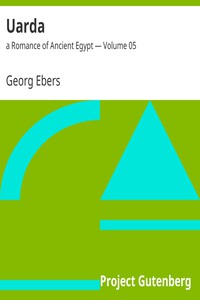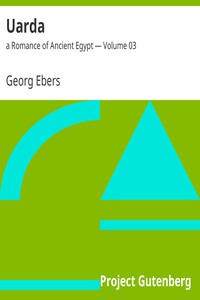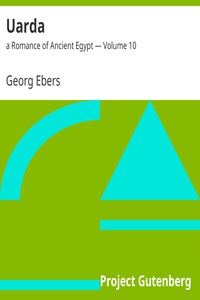Uarda : a Romance of Ancient Egypt — Volume 05 by Georg Ebers (e books free to read .txt) 📖

- Author: Georg Ebers
Book online «Uarda : a Romance of Ancient Egypt — Volume 05 by Georg Ebers (e books free to read .txt) 📖». Author Georg Ebers
[Radishes, onions, and garlic were the hors-d'oeuvre of an Egyptian
dinner. 1600 talents worth were consumed, according to Herodotus.
during the building of the pyramid of Cheops—L360,000 (in 1881.)]
then she helped Uarda, who did not need to be carried, into the house, and invited Nebsecht to share their meal. He accepted her invitation, for he had eaten nothing since the previous evening.
When the old woman had once more disappeared indoors, he asked the paraschites:
"Whose heart is it that you have brought me, and how did it come into your hands?"
"Tell me first," said the other, "why thou hast laid such a heavy sin upon my soul?"
"Because I want to investigate the structure of the human heart," said Nebsecht, "so that, when I meet with diseased hearts, I may be able to cure them."
The paraschites looked for a long time at the ground in silence; then he said:
"Art thou speaking the truth?"
"Yes," replied the leech with convincing emphasis. "I am glad," said the old man, "for thou givest help to the poor."
"As willingly as to the rich!" exclaimed Nebsecht. "But tell me now where you got the heart."
"I went into the house of the embalmer," said the old man, after he had selected a few large flints, to which, with crafty blows, he gave the shape of knives, "and there I found three bodies in which I had to make the eight prescribed incisions with my flint-knife. When the dead lie there undressed on the wooden bench they all look alike, and the begger lies as still as the favorite son of a king. But I knew very well who lay before me. The strong old body in the middle of the table was the corpse of the Superior of the temple of Hatasu, and beyond, close by each other, were laid a stone-mason of the Necropolis, and a poor girl from the strangers' quarter, who had died of consumption—two miserable wasted figures. I had known the Prophet well, for I had met him a hundred times in his gilt litter, and we always called him Rui, the rich. I did my duty by all three, I was driven away with the usual stoning, and then I arranged the inward parts of the bodies with my mates. Those of the Prophet are to be preserved later in an alabaster canopus,
[This vase was called canopus at a later date. There were four of them for each mummy.]
those of the mason and the girl were put back in their bodies.
"Then I went up to the three bodies, and I asked myself, to which I should do such a wrong as to rob him of his heart. I turned to the two poor ones, and I hastily went up to the sinning girl. Then I heard the voice of the demon that cried out in my heart 'The girl was poor and despised like you while she walked on Seb,
[Seb is the earth; Plutarch calls Seb Chronos. He is often spoken of as the "father of the gods" on the monuments. He is the god of time, and as the Egyptians regarded matter as eternal, it is not by accident that the sign which represented the earth was also used for eternity.]
perhaps she may find compensation and peace in the other world if you do not mutilate her; and when I turned to the mason's lean corpse, and looked at his hands, which were harder and rougher than my own, the demon whispered the same. Then I stood before the strong, stout corpse of the prophet Rui, who died of apoplexy, and I remembered the honor and the riches that he had enjoyed on earth, and that he at least for a time had known happiness and ease. And as soon as I was alone, I slipped my hand into the bag, and changed the sheep's heart for his.
"Perhaps I am doubly guilty for playing such an accursed trick with the heart of a high-priest; but Rui's body will be hung round with a hundred amulets, Scarabaei
[Imitations of the sacred beetle Scarabaeus made of various materials were frequently put into the mummies in the place of the heart. Large specimens have often the 26th, 30th, and 64th chapters of the Book of the Dead engraved on them, as they treat of the heart.
will be placed over his heart, and holy oil and sacred sentences will preserve him from all the fiends on his road to Amenti,—[Underworld]— while no one will devote helping talismans to the poor. And then! thou hast sworn, in that world, in the hall of judgment, to take my guilt on thyself."
Nebsecht gave the old man his hand.
"That I will," said he, "and I should have chosen as you did. Now take this draught, divide it in four parts, and give it to Uarda for four evenings following. Begin this evening, and by the day after to-morrow I think she will be quite well. I will come again and look after her. Now go to rest, and let me stay a while out here; before the star of Isis is extinguished I will be gone, for they have long been expecting me at the temple."
When the paraschites came out of his but the next morning, Nebsecht had vanished; but a blood-stained cloth that lay by the remains of the fire showed the old man that the impatient investigator had examined the heart of the high-priest during the night, and perhaps cut it up.
Terror fell upon him, and in agony of mind he threw himself on his knees as the golden bark of the Sun-God appeared on the horizon, and he prayed fervently, first for Uarda, and then for the salvation of his imperilled soul.
He rose encouraged, convinced himself that his granddaughter was progressing towards recovery, bid farewell to his wife, took his flint knife and his bronze hook,
[The brains of corpses were drawn out of the nose with a hook.
Herodotus II. 87.]
and went to the house of the embalmer to follow his dismal calling.
The group of buildings in which the greater number of the corpses from Thebes went through the processes of mummifying, lay on the bare desert- land at some distance from his hovel, southwards from the House of Seti at the foot of the mountain. They occupied by themselves a fairly large space, enclosed by a rough wall of dried mud-bricks.
The bodies were brought in through the great gate towards the Nile, and delivered to the kolchytes,—[The whole guild of embalmers]—while the priests, paraschites, and tariclleutes,—[Salter of the bodies]— bearers and assistants, who here did their daily work, as well as innumerable water-carriers who came up from the Nile, loaded with skins, found their way into the establishment by a side gate.
At the farthest northern building of wood, with a separate gate, in which the orders of the bereaved were taken, and often indeed those of men still in active life, who thought to provide betimes for their suitable interment.
The crowd in this house was considerable. About fifty men and women were moving in it at the present moment, all of different ranks, and not only from Thebes but from many smaller towns of Upper Egypt, to make purchases or to give commissions to the functionaries who were busy here.
This bazaar of the dead was well supplied, for coffins of every form stood up against the walls, from the simplest chest to the richly gilt and painted coffer, in form resembling a mummy. On wooden shelves lay endless rolls of coarse and fine linen, in which the limbs of the mummies were enveloped, and which were manufactured by the people of the embalming establishment under the protection of the tutelar goddesses of weavers, Neith, Isis and Nephthys, though some were ordered from a distance, particularly from Sais.
There was free choice for the visitors of this pattern-room in the matter of mummy-cases and cloths, as well as of necklets, scarabaei, statuettes, Uza-eyes, girdles, head-rests, triangles, split-rings, staves, and other symbolic objects, which were attached to the dead as sacred amulets, or bound up in the wrappings.
There were innumerable stamps of baked clay, which were buried in the earth to show any one who might dispute the limits, how far each grave extended, images of the gods, which were laid in the sand to purify and sanctify it—for by nature it belonged to Seth-Typhon—as well as the figures called Schebti, which were either enclosed several together in little boxes, or laid separately in the grave; it was supposed that they would help the dead to till the fields of the blessed with the pick-axe, plough, and seed-bag which they carried on their shoulders.
The widow and the steward of the wealthy Superior of the temple of Hatasu, and with them a priest of high rank, were in eager discussion with the officials of the embalming-House, and were selecting the most costly of the patterns of mummy-cases which were offered to their inspection, the finest linen, and amulets of malachite, and lapis-lazuli, of blood-stone, carnelian and green felspar, as well as the most elegant alabaster canopi for the deceased; his body was to be enclosed first in a sort of case of papier-mache, and then in a wooden and a stone coffin. They wrote his name on a wax tablet which was ready for the purpose, with those of his parents, his wife and children, and all his titles; they ordered what verses should be written on his coffin, what on the papyrus- rolls to be enclosed in it, and what should be set out above his name. With regard to the inscription on the walls of the tomb, the pedestal of the statue to be placed there and the face of the stele—[Stone tablet with round pediment.]—to be erected in it, yet further particulars would be given; a priest of the temple of Seti was charged to write them, and to draw up a catalogue of the rich offerings of the survivors. The last could be done later, when, after the division of the property, the amount of the fortune he had left could be ascertained. The mere mummifying of the body with the finest oils and essences, cloths, amulets, and cases, would cost a talent of silver, without the stone sarcophagus.
The widow wore a long mourning robe, her forehead was lightly daubed with Nile-mud, and in the midst of her chaffering with the functionaries of the embalming-house, whose prices she complained of as enormous and rapacious, from time to time she broke out into a loud wail of grief— as the occasion demanded.
More modest citizens finished their commissions sooner, though it was not unusual for the income of a whole year to be sacrificed for the embalming of the head of a household—the father or the mother of a family. The mummifying of the poor was cheap, and that of the poorest had to be provided by the kolchytes as a tribute to the king, to whom also they were obliged to pay a tax in linen from their looms.
This place of business was carefully separated from the rest of the establishment, which none but those who were engaged in the processes carried on there were on any account permitted to enter. The kolchytes formed a closely-limited guild at the head of which stood a certain number of priests, and from among them the masters of the many thousand members were chosen. This guild was highly respected, even the taricheutes, who were entrusted with the actual work of embalming, could venture to mix with the other citizens, although in Thebes itself people always avoided them with a certain horror; only the paraschites, whose duty it was to open the body, bore the whole curse of uncleanness. Certainly the place where these people fulfilled their office was dismal enough.
The stone chamber in which the bodies were opened, and the halls in which they were prepared with salt, had adjoining them a variety of laboratories and
 Have you ever thought about what fiction is? Probably, such a question may seem surprising: and so everything is clear. Every person throughout his life has to repeatedly create the works he needs for specific purposes - statements, autobiographies, dictations - using not gypsum or clay, not musical notes, not paints, but just a word. At the same time, almost every person will be very surprised if he is told that he thereby created a work of fiction, which is very different from visual art, music and sculpture making. However, everyone understands that a student's essay or dictation is fundamentally different from novels, short stories, news that are created by professional writers. In the works of professionals there is the most important difference - excogitation. But, oddly enough, in a school literature course, you don’t realize the full power of fiction. So using our website in your free time discover fiction for yourself.
Have you ever thought about what fiction is? Probably, such a question may seem surprising: and so everything is clear. Every person throughout his life has to repeatedly create the works he needs for specific purposes - statements, autobiographies, dictations - using not gypsum or clay, not musical notes, not paints, but just a word. At the same time, almost every person will be very surprised if he is told that he thereby created a work of fiction, which is very different from visual art, music and sculpture making. However, everyone understands that a student's essay or dictation is fundamentally different from novels, short stories, news that are created by professional writers. In the works of professionals there is the most important difference - excogitation. But, oddly enough, in a school literature course, you don’t realize the full power of fiction. So using our website in your free time discover fiction for yourself. 




Comments (0)